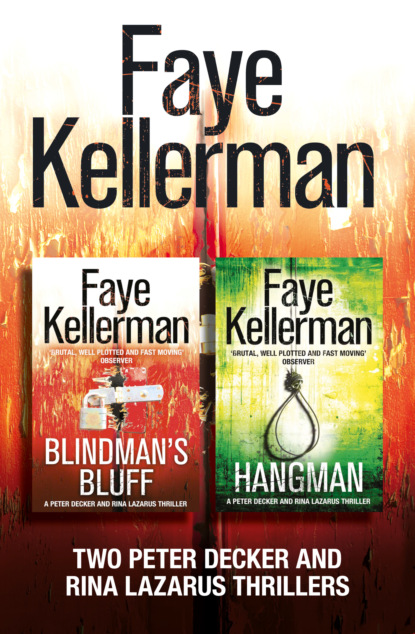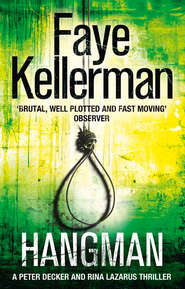По всем вопросам обращайтесь на: info@litportal.ru
(©) 2003-2025.
✖
Peter Decker 2-Book Thriller Collection: Blindman’s Bluff, Hangman
Автор
Год написания книги
2019
Настройки чтения
Размер шрифта
Высота строк
Поля
“So … there we have it. You don’t need to be involved.”
“So why bring it up in the first place?” Rina asked him.
“I was just trying to get an idea whether or not this guy is legit.”
“He definitely works as a translator for the courts.”
“How reliable do you think Harriman is?”
“Me?” Rina pointed to her chest. “I couldn’t tell you. The guy seems to know his languages. And he’s very dramatic. We used to call him Smiling Tom—after Tom Cruise—because he wore sunglasses and was always flashing a big white grin. After hearing him translate, we all decided that he missed his calling as an actor.”
“So you think he might be exaggerating?”
“I can’t tell you that. Just that he plays his voice like an instrument. Some soloists are more subtle than others. Actually I didn’t even know he was blind until he talked to me. He uses some kind of electronic locator to move about. He walks like anyone else.”
Decker tried to look casual. “Okay. Thanks for helping out.”
“That’s it?”
“Just wanted to get a feel for the guy.”
“Peter, I’d be happy to look through the mug books.”
“What for? Even if you picked someone out, I couldn’t haul him in. Like I said, Harriman heard the conversation, not you.”
“You could ask them to come in voluntarily. If they didn’t, that would tell you something. And once you got them in, maybe Harriman could recognize the voices.”
“Harriman said he’d absolutely be able to recognize the voices. But I don’t know if that would hold up in court.”
“You said that Harriman mentioned names that only an insider would know about. And you’re telling me that you’re not interested in talking to these guys?” When Decker didn’t answer, she said, “Let me look, Peter. Chances are I might not recognize anyone or they’re not in there.”
He remained silent.
Rina said, “Whoever did it shouldn’t be walking free and clear. If it was anyone else other than Cindy, Hannah, or me, you’d be hounding them.”
“That’s probably true.”
“All I’d be doing is looking at mug shots.”
“It’s not the looking at the mug shots I mind. It’s the recognizing part that makes me nervous.”
She laid her cheek on his arm. “Don’t worry. I have a big, strong man to protect me. He has a gun and he knows how to use it.”
He awoke to the sound of the phone ringing. When the door opened, letting in artificial light, he announced he was awake and sat up. Rina told him that Willy Brubeck was on the line and it sounded important.
Decker said, “What’s up, Willy?”
“I just got off the phone with Milfred Connors. He’s willing to talk to us.”
“Okay.” Decker turned on the nightstand lamp. “When?”
“Tonight. I told him we’d be there as soon as we could. He lives in Long Beach so we better get a move on it. Want me to pick you up?”
Decker’s brain was still in a fog. He checked the nightstand clock. It was quarter to eight. He’d slept for seven hours. “Uh, sure. That sounds fine.”
“That’s good ’cause I’m right outside your door.”
“You are?” Decker stood up and stretched. “I need about ten minutes to shower and dress. Come inside and wait.”
“Sounds good to me. Tell me, Rabbi. Does your wife still bake?”
Decker laughed. “We’ve got some leftover layer cake. I believe it’s chocolate. You can have as much as you want.”
“Just a slice if you don’t mind.”
“Not at all. I’ll ask her to put a pot of coffee on. We working dogs live on caffeine and sugar.”
Unlike most coastal regions, Long Beach never commanded the spectacular real estate prices common in other So Cal beach communities, probably because the city’s tenor was more industrial than resort. From the 405 south, Decker was offered a bird’s-eye view of the refineries belching out smoke followed by acres of car lots. That didn’t mean there weren’t some nice areas: certainly the old downtown area with its hotels and the famous aquarium had been revamped to attract the tourists. Still, most of the residential areas were made up of modest homes when compared with other shoreline districts.
Milfred Connors lived in a small California-style bungalow—stucco exterior and red-tiled roof illuminated by a streetlamp. It was one story sitting on a bumpy lawn almost devoid of landscaping. The cracked walkway led up to a dilapidated porch. The light was on and Decker rang the bell. The man who answered was stoop shouldered and rail thin. He had wisps of gray tendrils atop his head and a long, drawn face. He appeared to be around seventy plus or minus five years. He had on a white shirt, slacks, and slippers. He stepped aside so that the detectives could come into the house.
The living room was neat and spare, the furniture including a floral couch, a leather recliner, and a flat-screen TV sitting on a plywood bureau. Scarred wood floors but quarter sawn oak, Decker noticed. They were original to the house.
“Have a seat.” He offered them the sofa. “Would either of you like some coffee or tea?”
“I’m fine,” Decker said, “but thank you.”
“Me too, thanks,” Brubeck said.
“Then just give me a minute to get my tea.” He disappeared and came back a minute later holding a steaming mug. He sat on his leather recliner but didn’t recline. “Is the visit about the Kaffey murders?”
Decker said, “Yes, in a way.”
“Horrible thing.”
“Yes, it is.” Decker paused. “You worked for the company for a long time.”
“Thirty years.”
“Ever get a chance to see Guy interact with his brother or his sons?”
“All the time.”
“What would you say about their relationships?”
“Well, now …” Connors sipped tea. “Guy could be rough. But he could be nice, too.”
“Did you get along with him?”











